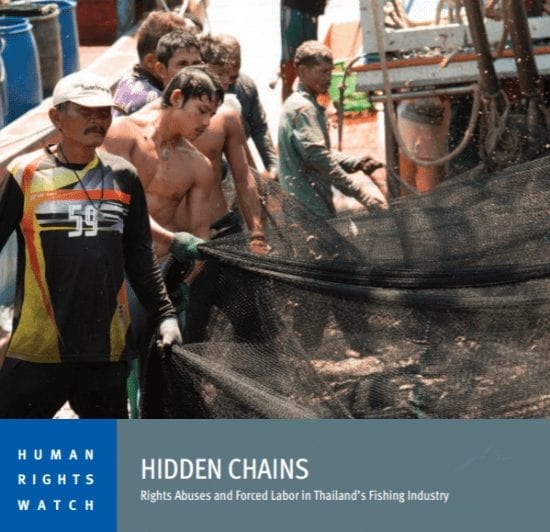
Hidden Chains: Rights Abuses and Forced Labor in Thailand’s Fishing Industry (English & Thai)
Despite several years of highly publicized efforts to address problems in the Thai fishing industry, the Thai government has not taken the steps necessary to end forced labor and other serious abuses on fishing boats.
This report documents forced labor and other human rights abuses in the Thai fishing sector. It identifies poor working conditions, recruitment processes, terms of employment, and industry practices that put already vulnerable migrant workers into abusive situations—and often keep them there. It assesses government efforts to address labor rights violations and other mistreatment of migrant fishers. It also highlights improvements and shortcomings in Thai law and the operational practice of frontline agencies that allow victims of forced labor to fall through gaps in existing prevention and protection frameworks. For example, in an official report from 2015, the Thai government noted that inspections of 474,334 fishery workers had failed, astonishingly, to identify a single case of forced labor.
***
แม้จะมีการประกาศอย่างกว้างขวางในช่วงหลายปีทีผ่านมา ถึงความพยายามทีจะแก้ปัญหาในอุตสาหกรรมประมงไทย แต่รัฐบาลไทยยังไม่ได้ดําเนินการทีจําเป็น เพือยุติแรงงานบังคับและการปฏิบัติมิชอบร้ายแรงในรูปแบบอืนในเรือประมง
รายงานนีให้ข้อมูลประเด็นแรงงานบังคับ และการปฏิบัติมิชอบด้านสิทธิมนุษยชนอืน ๆ ในภาคประมงไทย จําแนกสภาพการทํางานทีเลวร้าย กระบวนการจ้างงาน เงือนไขการจ้างงาน และการปฏิบัติในอุตสาหกรรม ซึงส่งผลให้แรงงานข้ามชาติอยู่ในสภาพทีถูกปฏิบัติมิชอบ และต้องทนอยู่ในสภาพนันต่อไป เป็นการประเมินผลการดําเนินงานของรัฐบาลเพือแก้ปัญหาการละเมิดสิทธิแรงงานและการปฏิบัติทีเลวร้ายอืน ๆ ต่อแรงงานต่างด้าวภาคประมง ยังเน้นให้เห็นการปรับปรุงและข้อบกพร่องของระบบกฎหมายและขันตอนปฏิบัติในไทยของหน่วยงานในพืนที อันเป็นเหตุให้เกิดปัญหาเหยือแรงงานบังคับทีเกิดขึนได้จากช่องว่างของกรอบเพือการป้องกันและคุ้มครองทีเป็นอยู่ ยกตัวอย่างเช่น ในรายงานของรัฐบาลไทยเมือปี ระบุว่าจากการตรวจคัดแยกคนงานประมง 474,334 คน กลับไม่พบว่ามีกรณีแรงงานบังคับแม้แต่คนเดียว ซึงเป็นเรืองน่าประหลาดใจ
